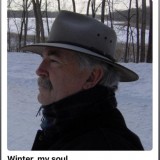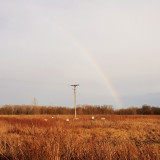Weekly Contest Results, 2018-May-14
-
Larry Chamberlin
7 years ago, updated 7 years agoLoss is a perennial theme inspiring great poetry. The judges recognized the power of loss this week in choosing three works: Ben Pickard’s grief filled outcry of a parent’s worst nightmare, (reposted from his old account, I believe), Ben (Naughtymouse)’s anguish clinging to the poetry of his lost love and MaryAnne’s mournful dirge to her own lost love.
Thanks to the judges for their timely submission of comments on Saturday. I would have posted this earlier but the site had to break a three-way tie for third place at 11 Points each. The comments were detailed; so much so, in fact, that I must post this as two entries, having exceeded the 12,000 character limit for one post.
Front page:
I Cling to Thy Poetry by Ben 10+10= 20 Points
My Tears Are Not Enough by Ben Pickard 10+7= 17 Points
Freewrites, yet not free from you by Poet on the Piano 7+4= 11 Points
Honorably Mentioned:
Alternative Viewing by Mark Rawlins 7+4= 11 Points
Bluebells Within the Mist by Mr. Darcy 7+4= 11 Points
Ankerwycke (Trois-par-huit) by Darren 10 Points
How far the light is? by Sinners Gospel 10 Points
Without you (rondeau) by Michael 4+4= 8 Points
Don't Love Me by Larry Chamberlin 7 Points
..............................
~*~*~*~*~*~*~*~*~*~*~*~*
I Cling to Thy Poetry by Ben 10 Points
To begin, this poem is just fantastic. Now with that out of the way, let’s get a little more in-depth with the analysis.
The first thing that caught me was the linguistic choice, more in the old English style, and how in modern times you see that choice much more rarely and even more rarely do you see it executed with such fluidity as it is in this piece. The open – “I hath never been so content” – in a single line presents us with a setting, the moment in the author’s life in which they found peak contentment. A more difficult task to accomplish than one may think, setting a scene without scene description, but perfectly done here.
The opening complete stanza begins with a pair of alliterative lines sandwiching the second – “long afternoons on lush” and “lounging in auspicious light” – while also being closed with an alliterative phrase – “with scent and song”. This bookending of alliteration does well to pace the rhythm of this first stanza. Additionally, the diction of this stanza (and the piece as a whole) appears to be well-considered before being put to page.
Into the second stanza, we begin with some quite pleasing and surreptitious internal rhyme – “indeed” to “leaves” to “sweet melodies” – playing well on the –e sound within each word. Again, the pacing feels natural and unhurried as it winds along into the closing section of the piece.
As noted in some of the comments, the concluding three lines paint a beautiful ending to this poem. “I who were left/torn as a frost-laced spider web in a storm”. And how poetic to have the frost clinging to the torn web, as the author clings to the poetry of their lost love. Wonderful work, Ben!
~~~~~~~~~~~
I Cling to Thy Poetry by Ben 10 Points
As beautifully and serenely as this poem starts, we the reader are led a merry dance as Ben's effortless free verse descends into a yearning for a person who seems to have all but simply vanished from the "green banks of the riverside". After reading the first half, I simply wasn't expecting it to morph into such a sad piece of a love and a particular time that has gone. What happened to her? I am as baffled as the writer seems to be. Clinging to the poetry that is left behind, sadly, seems futile in his attempts to be happy; more a man's last desperate effort to hold onto something that is gone. Perhaps I am wrong, and her verse is filled with enough love and guile to maintain him - I am not so sure, though.
Technically, Ben is a master at old English and uses it sublimely here; it lends a nostalgic feel to a piece which, I suppose, centres around nostalgia itself. He himself may only have been left with his lover's lines, but - as selfish as it seems - we the reader are left (because of that) with this wonderful poem.
~*~*~*~*~*~*~*~*~*~*~*~*
My Tears Are Not Enough by Ben Pickard 7 Points
This author never fails to deliver. Week upon week, out of their factory of verse, pops out another poem, containing melodic meter, immense imagery and, and…
Here this week, hot off the conveyor belt of rhyme is a poem about, depression. Oh well, so much for the introduction.
The author sets out a nature scene in delectable detail. I could imagine myself walking that shingled shore, then 'Bam' in stark contrast, flashes of a vivid, sinister dream hit you. This is, what I imagine, post-traumatic stress disorder (PTSD) to be like - waking up in cold sweats. In the next verse, just as the beauty of nature begins to calm the reader, an audio shock this time, more PTSD references. I do like the way the author has carefully worked into the meter the 'screams' and 'shouts'; almost as if we could hear them too. Bravo!
The poem continues with pressing mountains, piling on the pressure; looming over like a monster. As the poem reached a climax (not again) we are led to its conclusion. I see a man, possibly during a war dying (maybe through suicide) his words beyond the grave, being the apology to his loved ones, heard ghostly, at the edges of that fateful lake.
Now for the critique:
I found, for the most part, the flow of lines and verses worked well. Where I struggled slightly I will add my bracketed suggestions:
1.Is still what haunts my dreams the most;
(still haunts my dreams the most)
2. Will ever blight your youthful ghost.
(will ever light your youthful ghost)
3. And seem to freeze my feet with glee -
(my feet freeze now with glee)
4. That still compound my misery.
(That compound my misery.)
5.The clouds seem closer than before.
(those clouds closer than before)
6. Then echoes of your wails were all;
(before your echoed wails were all)
7. Each summer is a howling squall.
(Each summer's a howling squall)
^
The above suggestions are only that. I can see the author has used an 8-syllable line count and this is fine; but, crafting each line to this remit; it does, for me, detract from the potential smoothness of iambic sounds. As a judge, I feel that although this poem is worthy of merit, from me, this week, I award a heady, 7 points (7)
~~~~~~~~~~~
My Tears Are Not Enough by Ben Pickard 10 Points
In iambic tetrameter, surprise surprise, Ben (Pickard to alleviate confusion) illustrates a beautiful shoreline with a mountainous backdrop. Right from the start I was hit with unease at the idea of crunching seashells underfoot, and knew something must have happened at this beach. The personification of the ripples freezing someone in place while they are assaulted by ghosts of their past was a particularly devious imagery. Then to add to that... the mountains are pressing in and the clouds are heavy, with sadness yes, but also with guilt as the reader later finds out. I was quite literally moved to tears at the last stanza, with the image of a child lost and a heartbroken father. This poem is well, and technically, written; rhymed beautifully throughout, and tells a heartgripping story.
~*~*~*~*~*~*~*~*~*~*~*~*
Freewrites, yet not free from you by Poet on the Piano 7 Points
The opening line of this piece really drew me in, especially with the imaginative color description of the author’s sneakers – “the color of a cotton candy sky”. The chosen sneaker, as well, links well with the closing of this first stanza (statement, what-have-you) where the author wishes to have the power to take flight – to walk on air, perhaps. Additionally, the two segments rhyming made for a delightful in its writing, though somber, opening to this poem.
The opening stanza, also, prepares us for the wonderful imagery we are in for throughout the remainder of this piece. Other beautiful examples include, “these deep purple walls I wish I could sink into” and “Cinnamon and vanilla run down my throat with ease”. Despite the poem’s heaviness, the author has placed some superb elements spread out within the stanzas to urge the reader’s senses into action – to see the places described, to taste and smell the atmosphere surrounding.
Prose poems can often become very ambling and lose their intended path, but this piece follows its journey well, the author lighting the darkness of their daily struggle with reprieves from the gloom that they have to endure. “Daydreams can only be embraced for so long” – and this is true, for I wanted this piece to continue with its momentary levity, to see what bright spots the author finds amidst the harsh reality of their personal existence, but the conclusion had to come as it does.
Powerful writing and imagery and a well-deserved nomination.
~~~~~~~~~~~
Freewrites, yet not free from you by Poet on the Piano 4 Points
With metaphors and similes as kindling, this freeform burns with truth and honesty. She tells us about her world, as she sees it. The quiet girl at the library who doesn't talk, and who would notice? It's the library! A mother who feels for her child. A father who can't hide his feelings. She's in her safe place sipping coffee and, in her own way... She's letting us in.
-
Larry Chamberlin
7 years ago~*~*~*~*~*~*~*~*~*~*~*~*
Bluebells Within the Mist by Mr. Darcy 7 Points
A lot of editing goes into a triolete, you are limited to 8 lines and 2 of those lines repeat! To add to that, you are only left with three more lines and they have to rhyme with the other two in a specific order. It's difficult to paint a picture with just a few shades of just one color but Mr. Darcy does so in a tender monochromatic blue. This poem is as beautiful as it's namesake and oozes of love and of loss.
~~~~~~~~~~~
Bluebells Within the Mist by Mr. Darcy 4 Points
“A voice beyond the common knew” – What an interesting way to phrase the description of an unknown voice. The use of “knew” is almost jarring, but not in an unpleasant way, perhaps only unexpected, though the line flows perfectly.
The second line utilizing internal rhyme of “song” and “long” aids in the iambic flow of the piece, as well as the consistent “-ew/-oo/-ue” sound bringing a smoothness to the rhythm.
A well-executed practice of the triolet form. Well done!
~*~*~*~*~*~*~*~*~*~*~*~*
Alternative Viewing by Mark Rawlins 7 Points
Mark provided a good title along with good content. Something, quite different, with a proper rhyming. A bitter and harsh truth about the society we all live in. I don't know what to say about the news thing because it hasn't changed in last five decades. War, poverty, crime, disease, Hollywood, politics, it has always been the same and I don't expect much from future as we are only moving towards worse. Sometimes I feel like I am in a loop, the only difference is that I am growing older. The lines are a little longer but they never interrupt the flow of the poem. Believe me, it was very hard for me to choose between your poem and the other one for the 10 points. I want to thank Milly Hayward too for highlighting this poem.
~~~~~~~~~~~
Alternative Viewing by Mark Rawlins 4 Points
Written in seemingly straightforward rhyming couplets, this has a slightly different feel to it, helped not least by full stops in the middle of lines and the breaking up of other lines which I feel works well here.
As to the content, well, we could all do with a little alternative viewing from time to time, be it from the evening news or from the often mundane and depressing perspective we are left with of life. Those with a more delicate disposition don't have to drink too much of the world around them in before their inclination towards misery thoroughly consumes them. Turning off the bloody news is a good place to start remedying that! Well rhymed and well written, Mark.
~*~*~*~*~*~*~*~*~*~*~*~*
Ankerwycke (Trois-par-huit) by Darren 10 Points
The poetry has been splendid and my chosen poems could have easily dropped down through the ratings, like a dollar into the sewer.
Those of you that know this form will appreciate the complexity of it. Trois-par-huit, is a poem of 3 stanzas, containing 8 lines, each with a specified syllable count: 3,6,9,12,12,9,6,3 together with a set rhyme scheme. AAB BBC CC
With this template, all the writer has to do is fill it - simple… Not so, try it, give it a go and you'll see.
Thankfully, this author adds a link, explaining the, 'Ankerwycke'. It is, for those who don't know, an ancient Yew tree, some 2500 years old. It has an amazing girth (now, now) of 8 meters - that's some serious tree hugging material!
On this site we have lots of poetry, love, depression and nature…what I don't see much of are, poems highlighting significant achievements in nature; specifically, one tree. For this reason, combined with the difficult, well-crafted form, I decided to award a lofty: 10 points. ker-ching
The Ankerwycke is described by the author as a, Flora beast. I can see why - It is enormous, bearing a gnarling twisted, folded trunk with branches that tower, fanning out limbs and dense foliage, shrouding the ground beneath. Line 2 states an obvious, but true fact about the planter of this tree. I can only imagine the possible planters, a bird dropping a seed, or a deliberate action, intended to ward evil spirits away from a hallowed place. Apparently, it was beneath this very tree that King Henry VIII courted Anne Boleyn, some even romanticize of him proposing to her beneath its canopy.
In line 3, hundreds of years of evolving war, from cannons to planes are mentioned. Whereas, the next line the author uses alliteration to good effect. I can only imagine how many 'baby birds' have been reared in its branches. As the centuries past for this tree, hamlets became villages, became towns and cities. All the while, human 'family trees' spread out populating them all, inventions like 'steel' show our development.
From this point the poem is only halfway through. As a writer, you know you have to come to a conclusion before you run out of lines, out of syllables. In these increasing/ decreasing forms, this happens all to quick.
Line 5 offers a sample of weather endured; snow, frost, 'rain'. This last word worked well, flowing into line 6 in "cried for others". The mention of 'burning like candlewick' is not just a lead into the rhyming last lines, but also, highlighting the, undoubtedly, many fires that have burned beneath it, burning it/ charring it in the process - just like a 'candlewick.'
Line 7 - simple, yet effective descriptions of this great Yew, leading to the one word, 3 syllables - Ankerwycke. This word, I would imagine was the starting point for this poem, everything needed to be worked backward, the rhyme, the slow building history, leading back to its inception.
Top marks (10)
~*~*~*~*~*~*~*~*~*~*~*~*
How far the light is? by Sinners Gospel 10 Points
All of us want the same thing for her daughter, it's just few of us won't be able to portray our emotions which you did it pretty well. I loved this whole idea of writing a poem about something positive she shared with us on the member message forum. I am quite sure a mother's grief can burn out the sun, but let's hope that moment never comes. It's the time to stick to positive. I do hope for the spring to come back again in Andrea's family. This stanza, I think you should have broken it into two stanzas.
So, I want to... listening to the songs.
The night is going to.... how far the light is?
It just an opinion.
Rest of the things look good. [10]
~*~*~*~*~*~*~*~*~*~*~*~*
Don't Love Me by Larry Chamberlin 7 Points
I like the truth of this poem - it is written with the kind of raw honesty that only true love and experience can possibly understand. 'Love' is too often superficial, built around nothing but passion's initial heat and childish dreams that are not so easily achieved as life actually happens to you. Here the writer implores his partner to love him from the "lowest stratum" where it must work through the knocks and bruises that life has administered to forge a relationship that is actually earned and strong enough to endure whatever else may be thrown their way. And as far as that is concerned, there will always be something to derail us, but I'm sure the writer and his partner have the experience and love to navigate that.
~*~*~*~*~*~*~*~*~*~*~*~*
Without you (rondeau) by Michael 4 Points
The rondeau form is a lovely form. It is compact, yet can pack a punch. It's refrain weaves throughout the piece which makes a perfect choice for the author who want to portray a wistful tone.
Here this author speaks of missing another. Night after night, alone without that special someone, someone who can remove the 'dull and gloom'. I especially liked, the 'wind-chimes' reference - I could easily imagine these dancing around, emitting joyful tones; just like having a person of joy in the room. It is true, loneliness can create maddening thoughts.
The poem continues as does the imagined friendly voice, helping them stay sane. I can feel the pain, the absolute longing for their return. Eyes closed and then a prayer to the wind, to somehow bring them home and end this anguish. Alas, all good rondeaus end with the reader wanting more.
I found the meter to be pretty good. However, the inconsistency with capital letters detracted slightly, as did these lines: 'without you here feels dull and gloom' and: 'wind-chimes jingle and play a tune'. In the 1st line, I understood the intent. It seemed that in trying to look after the meter and possibly the rhyme, the content was slightly lost. I personally would have substituted this line for: 'without you, life is dull and gloom'. In the 2nd line, the meter is not quite right. The stressed and non-stresses are not in the correct places. My substituted line would read: 'Jingling wind-chimes play a tune'.
I feel with a little editing, here and there, this piece of formed poetry will cry forever. For this reason, I award a respected, 4 points. (4)
~~~~~~~~~~~
Without you (rondeau) by Michael 4 Points
Last week, some judge pointed out few things in certain poems and thank God you guys handled it in a Calm way. Michael said nothing besides thanking the judges and then wrote this rondeau ~ one of the hard form as far as rhyming is concerned ~ and gave the answer to the question. Yes, One can write in perfect rhyming without interrupting the flow. It's possible. You guys might be thinking why just 4 points for this perfect poem?
Well, I have learned few things last week. One of them is that judging is all about pleasing others. So, sorry Michael, can't tell you why?
And thank you so much for writing this poem. -
Em (marmite)
7 years agoGreat going judges yet another wonderful week of poetry, thanks Larry for hosting
-
naaz
7 years agoCongratulations to our front page winners, the HM's and the nominated ones.
Thanks to judges and moderators for all their support and love towards all of us.
Thanks to sir Larry for hosting the contest this week.
Let's cheer up together for Ben, Ben Pickard and Maryanne on their perfect win.
Love you all! -
Ben Pickard
7 years ago, updated 7 years agoWell done, all, a huge congratulations all round.
To the judge who awarded me their 7 points, thank you so much for such an in depth comment with some amazing suggestions. All I would say is, as the other judge mentioned, it is written in iambic tetrameter so I couldn't sacrifice the 8 syllable lines.
-
-
Lost One replied to Ben Pickard
7 years agoBen suffers from OCT, (obsessive compulsive tetrameter), when he says he couldn't sacrifice the 8 syllable lines he really means it
; ) -
Ben
7 years agoWell done everyone and thankyou judges so much for your time spent commenting, really the the effort you put in does not become lost on us, made my day :)
-
Poet on the Piano
7 years agoCongratulations to all! Thank you to the judges for your time and amazing analyses/insight... we appreciate you! And thank you to the two judges who voted and commented on my piece. Thanks to Larry for posting.
You all rock *fist in air*
Have a great week, everybody! -
Ben Pickard
7 years agoMichael, I believe the site decides when there is a tie, not the mods. Not sure, though.
As for your comment, Tony...you have no idea. :) -
mossgirl19
7 years agoWow, congrats All! Amazing poetry and in depth comments.
Tony, haha, agreed!
-
Meena Krish replied to mossgirl19
7 years agoCongrats to the Winners and HM's.
Thank you judges and thank you for hosting Larry :) -
Larry Chamberlin replied to Mr. Darcy
7 years ago, updated 7 years agoMichael & everyone,
Just a correction. The mods don’t break ties. Long ago we had a public discussion on a forum and the membership agreed by majority that we would allow the site algorithm to break all ties. -
Larry Chamberlin
7 years agoBTW, thanks to the judge for my comment and thanks to Em, Ben & Michael (Mr Darcy) for nominating my poems.
-
Kitty Cat Lady
7 years agoWell done to all winners, HMs and nominees. I'm a bit out of the loop at the mo but still love reading everything. :-)
=^.^=














